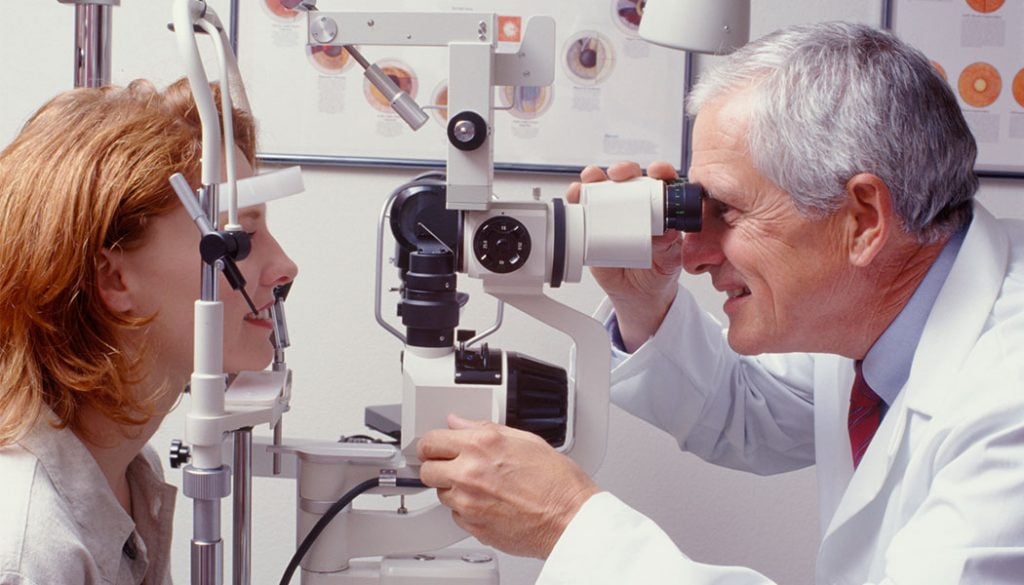Studies show that 1 in 28 Americans over age 40 experiences age-related vision loss — a rate expected to double by 2050. That’s the bad news. The good news is that there are several things you can do to protect your eyes and live with age-related vision changes.
How vision changes with age
For most people, the first hint of vision problems occurs at about 40 with presbyopia. The first sign of presbyopia for many patients is holding books and tablets at arm’s length to read them. This is because your eyes begin to lose flexibility in the lens as you age, which impacts their ability to switch focus from near to far. Many people start to wear reading glasses at this point to be able to read close up.
After 60, however, physical changes in the eye can become more dramatic:
- You may develop cataracts (clouding of the lens) which clouds your vision.
- Muscles that control pupil size and reaction to light weaken.
- Tear glands produce fewer tears, resulting in uncomfortable dry eye.
- The fluid (vitreous) changes with age, increasing the incidence of floaters or flashes of light.

Profound age-related vision changes
As our eyes age, they become more at risk of eye problems that can cause vision impairment or blindness. Some of these problems are natural parts of aging, some are results of other medical problems, and, unfortunately, some have a genetic component that cannot be prevented.
Age-related macular degeneration
Age-related macular degeneration (AMD) is the principal cause of vision loss among people 50 and older. With this condition, the macula — an essential part in the center of the retina — becomes damaged over time. There may be no signs or symptoms in the early stages of the disease.
However, as the condition progresses, AMD can decrease your visual field, blurring your central vision.
Diabetic retinopathy
Diabetic retinopathy may occur with prolonged high blood sugar related to uncontrolled or improperly managed diabetes. Most people are between 45 and 64 when diagnosed with type 2 diabetes, putting older adults who haven’t gotten their blood sugar under control at risk of vision loss.
Prolonged levels of elevated blood sugar can painlessly damage the eye’s blood vessels resulting in visual impairment or blindness. Diabetic retinopathy is one of the leading causes of blindness.
Glaucoma
Glaucoma is an eye disease where increased eye pressure damages the optic nerve. Because it is a painless disease, most patients only notice something is wrong once vision loss has already occurred. As the damage progresses, you may notice changes in your field of vision.
Retinal detachment
While most people know retinal detachment can occur due to eye injuries, it can also occur from normal aging of the eye. As the vitreous fluid thins with age, it pulls on the retina, tearing it and possibly tearing it or detaching it from the back of the eye.
Older people with high levels of nearsightedness are at higher risk of retinal detachment.
How do I keep my eyes healthy?
The most crucial thing aging people can do is get their eyes examined annually by an ophthalmologist or optometrist. Early detection of eye disease protects your vision and can prevent vision loss.
Loss of visual acuity caused by eye damage often isn’t reversible, so it’s important to catch eye conditions early. Since many of these conditions don’t have noticeable symptoms, it’s essential to consult an eye doctor regularly. Using digital retinal imaging or eye dilation, our doctors can see deep into the eye during a regular eye exam and catch these problems early. With early intervention, we can potentially avoid vision loss.
The American Academy of Ophthalmology recommends that adults over 65 have annual eye examinations. This is when early signs of disease or changes in vision may appear. Also, have our eye doctor check your eyeglasses and contact lenses. Ensuring your glasses and contacts are the correct prescription can prevent eye strain and discomfort.
Why choose Assil Gaur Eye Institute for your aging eyes?
The eye care professional team of ophthalmologists and optometrists at Assil Gaur Eye Institute (AGEI) offers world-class LASIK, and laser eye correction as well as cataract surgery and expert treatment of other eye conditions.
At AGEI, you experience a state-of-the-art healthcare facility that combines revolutionary technologies with experienced vision care professionals. Our goal is to help you achieve your personal best vision.
Please call 866-945-2745 or visit us here to make an appointment online. If you are experiencing any concerning symptoms, contact us immediately to determine the best time to schedule an exam.
We are conveniently located for patients throughout Southern California and the Los Angeles area at locations in or near Beverly Hills, Santa Monica, West Los Angeles, West Hollywood, Culver City, Hollywood, Venice, Marina del Rey, Malibu, Manhattan Beach, and Downtown Los Angeles, to name a few.
- Why is My Iris Inflamed? When to See a Doctor for Iritis - 12/01/2023
- How Your Vision Changes in Your 40s and 50s - 10/17/2023
- Winter Dry Eye Care Tips - 11/02/2021













